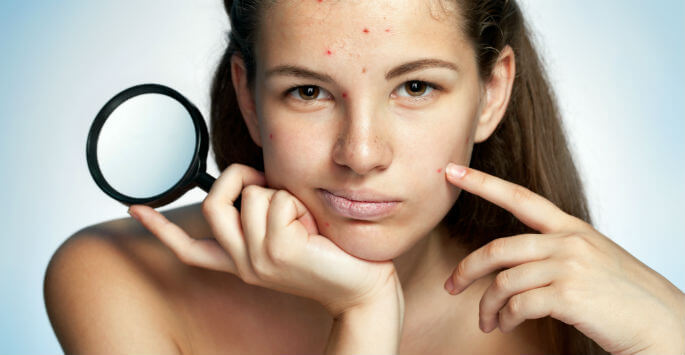Cystic acne is considered the most severe kind of acne. Deep, irritated, inflamed breakouts can form on the face or almost any other area of the body, and these annoying blemishes can become quite large, with some measuring multiple centimeters across in some cases.
What Does Cystic Acne Look and Feel Like?
Cystic acne blemishes feel like fluid-filled, soft lumps just beneath the surface of the skin and can be very painful for many people. Some cystic acne sufferers can develop nodules in addition to just cysts. The nodules are painful, hard lumps just under the surface of the skin just like cysts. Significantly larger than a papule in size, a nodule develops deep inside the skin tissue and can take a considerably long time to heal fully.
Who is Vulnerable to Cystic Acne?
Virtually anyone can get cystic acne. However, it appears to be more common among younger men and teenage boys. Chances are you’re more likely to get severe acne yourself if either of your parents experienced cystic acne.
Cystic Acne Causes
Cystic acne can be caused by the same factors as any other kind of acne, some of which include:
- Overactive oil-secreting glands
- Significant number of acne-producing bacteria
- Excessive number of dead skin cells trapped in pores or hair follicles
Inflamed acne lesions begin to form if the wall of the hair follicle bursts, leaking infected matter into the dermis. The blemish is typically minor and quickly heals if it ruptures near the surface of the skin. However, more intense breaks that occur in the follicle wall will likely cause much more severe skin lesions or blemishes. Nodules form once the contaminated matter begins to infect nearby follicles.
Similar to nodules, cysts start out as deep cracks in the wall of the pore. A membrane then starts to develop within the dermis around the infection itself. Some individuals are just naturally more inclined to develop these kinds of severe breakouts than other people depending on heredity and skin type.
Keep in mind that cystic acne isn’t caused by poor hygiene, eating too many sweets, or drinking soda. People who struggle with cystic acne are not responsible for bringing it on themselves, although learning how to maintain good skin care may help reduce the number of breakouts.
Helpful Advice
Never touch a cystic acne breakout, especially with unclean hands. You could make it worse if you touch it by making the infection go deeper and eventually spreading it. Nutrition, exercise, and plenty of rest are important factors in keeping skin as healthy as possible. Clinical research has revealed that a low-glycemic diet of low or no sugar may play a bigger role in eliminating symptoms than previously thought.
At Dermatology and Skin Cancer Center in Windermere, we offer treatment for both acne and cysts. Our medical team will work with you to determine the safest and most effective treatment for your needs. Contact Dermatology and Skin Cancer Center today to schedule your consultation.

